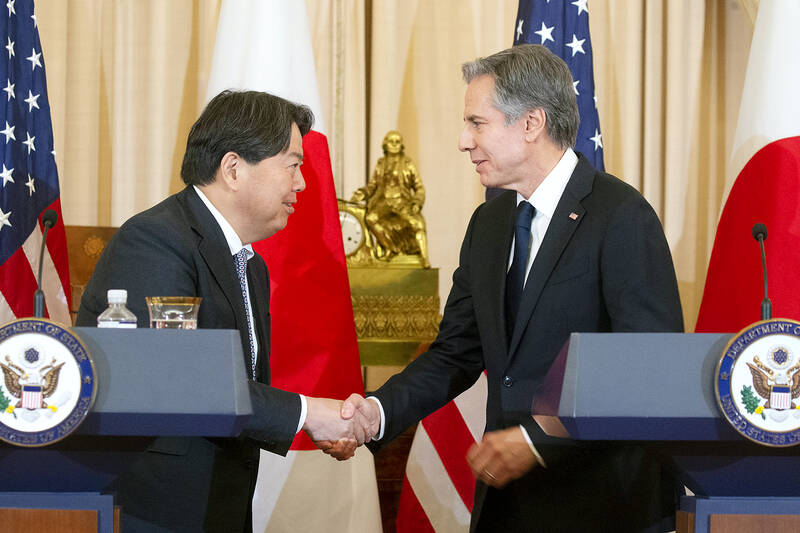The US and Japan on Wednesday said their position on Taiwan remains unchanged, and reiterated the importance of peace in the Taiwan Strait for the world.
The statement came after the US-Japan Security Consultative Committee met in Washington, before US President Joe Biden and Japanese Prime Minister Fumio Kishido meet today.
The security meeting between US Secretary of State Antony Blinken, US Secretary of Defense Lloyd Austin, Japanese Minister of Foreign Affairs Yoshimasa Hayashi and Japanese Minister of Defense Yasukazu Hamada covered topics such as the US-Japan alliance, the situation in the Taiwan Strait, Russia’s invasion of Ukraine and North Korean missile launches.

Photo: EPA-EFE
Yoshima told a post-meeting news conference that the participants reaffirmed that their position on Taiwan remains unchanged.
They also confirmed the importance of maintaining peace and stability across the Strait, which is essential for the safety and prosperity of the international community, Yoshima said.
The countries reiterated their stance in a joint statement released after the meeting.
The participants agreed that China’s provocative and coercive actions in the South China Sea, as well as unlawful claims on islands there, pose an “unprecedented and greatest strategic challenge” for the two countries, Yoshima said.
The US and Japan would continue to raise objections to China’s attempts to reshape the international order, which is a grave concern for the US-Japan alliance, he said.
The participants also agreed that there have not been any changes to their policies to improve communication with China, including in the area of security, Yoshimasa said.
Asked about efforts to deter China from unilaterally changing the cross-strait “status quo,” Blinken said that the US-Japan alliance intends to bolster the “status quo,” which has underpinned peace and stability in the Strait for decades.
The US and Japan oppose any actions to unilaterally change that “status quo,” and would continue to call for a calm and resolute approach to uphold peace and stability, he said.
When asked whether he still holds the view he expressed in October last year that he did not see an imminent invasion of Taiwan by China, Austin said he seriously doubts that China would imminently invade Taiwan, despite a recent increase in Chinese military activity around the nation.
China has demonstrated some “very provocative” behavior near Taiwan in an attempt to “establish a new normal,” but it is doubtful that this endeavor would precipitate an invasion, Austin said.
“We will continue to watch and we will continue to work with our allies and partners to do everything that we can to ensure that we promote peace and stability in the Strait and — and in the region overall,” he said.
The US also said that attacks in space would invoke its defense treaty with Japan and announced the deployment of a more agile Marine unit on its ally’s soil as alarm grows over China.
The joint statement said that “attacks to, from or within space present a clear challenge to the security of the alliance” that could invoke Article 5 of their mutual defense treaty, which considers an attack on one an attack on both.
The talks finalized a plan by the US send a so-called Marine Littoral Regiment, a more agile unit that can operate defenses both by sea and air, to Okinawa, the southern Japanese island strategically close to Taiwan.
Additional reporting by AFP

The Central Weather Administration (CWA) yesterday said it expected to issue a sea warning for Typhoon Fung-Wong tomorrow, which it said would possibly make landfall near central Taiwan. As of 2am yesterday, Fung-Wong was about 1,760km southeast of Oluanpi (鵝鑾鼻), Taiwan’s southernmost point, moving west-northwest at 26kph. It is forecast to reach Luzon in the northern Philippines by tomorrow, the CWA said. After entering the South China Sea, Typhoon Fung-Wong is likely to turn northward toward Taiwan, CWA forecaster Chang Chun-yao (張峻堯) said, adding that it would likely make landfall near central Taiwan. The CWA expects to issue a land

Taiwan’s exports soared to an all-time high of US$61.8 billion last month, surging 49.7 percent from a year earlier, as the global frenzy for artificial intelligence (AI) applications and new consumer electronics powered shipments of high-tech goods, the Ministry of Finance said yesterday. It was the first time exports had exceeded the US$60 billion mark, fueled by the global boom in AI development that has significantly boosted Taiwanese companies across the international supply chain, Department of Statistics Director-General Beatrice Tsai (蔡美娜) told a media briefing. “There is a consensus among major AI players that the upcycle is still in its early stage,”

The Central Weather Administration (CWA) yesterday said it is expected to issue a sea warning for Typhoon Fung-wong this afternoon and a land warning tomorrow. As of 1pm, the storm was about 1,070km southeast of Oluanpi (鵝鑾鼻), Taiwan’s southernmost point, and was moving west-northwest at 28 to 32kph, according to CWA data. The storm had a radius of 250km, with maximum sustained winds of 173kph and gusts reaching 209kph, the CWA added. The storm is forecast to pass near Luzon in the Philippines before entering the South China Sea and potentially turning northward toward Taiwan, the CWA said. CWA forecaster Chang Chun-yao (張峻堯) said

‘SECRETS’: While saying China would not attack during his presidency, Donald Trump declined to say how Washington would respond if Beijing were to take military action US President Donald Trump said that China would not take military action against Taiwan while he is president, as the Chinese leaders “know the consequences.” Trump made the statement during an interview on CBS’ 60 Minutes program that aired on Sunday, a few days after his meeting with Chinese President Xi Jinping (習近平) in South Korea. “He [Xi] has openly said, and his people have openly said at meetings, ‘we would never do anything while President Trump is president,’ because they know the consequences,” Trump said in the interview. However, he repeatedly declined to say exactly how Washington would respond in